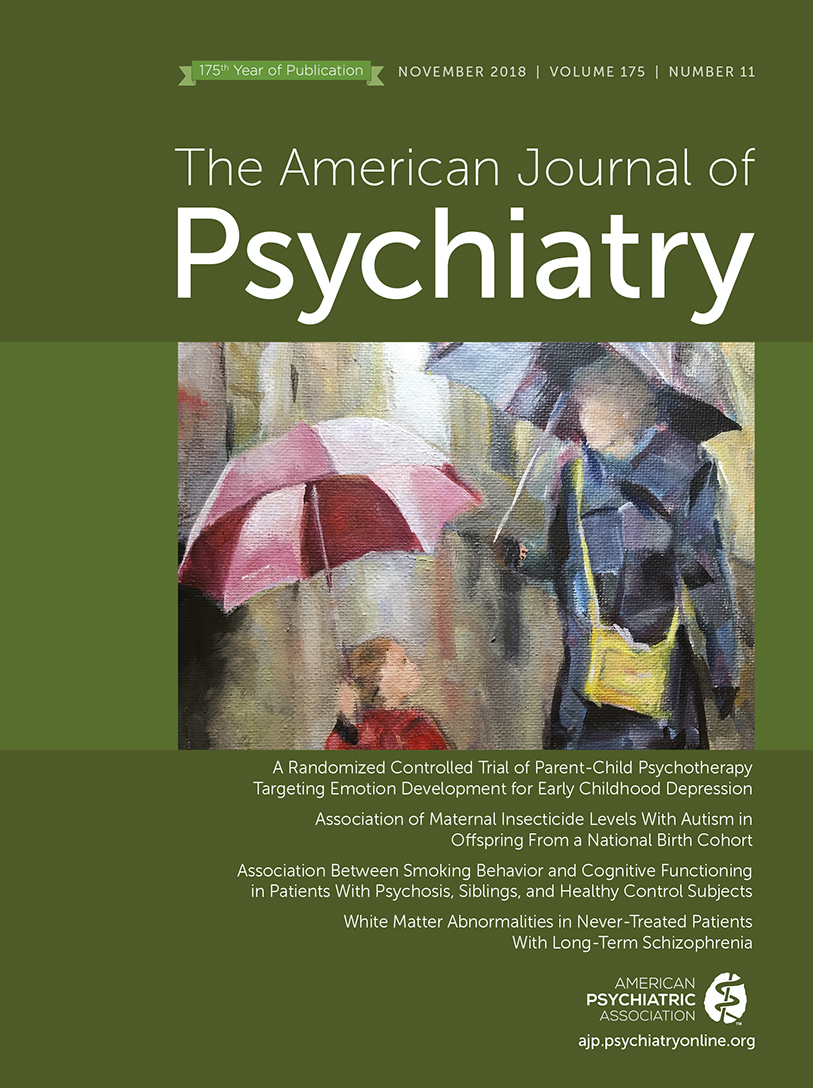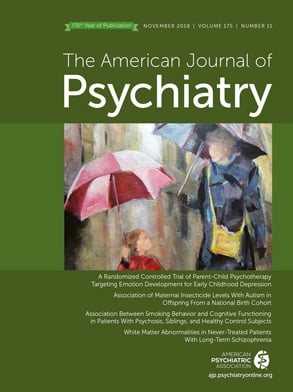Cigarette smoking is commonly associated with severe mental illness. As noted in an article by Vermeulen et al. in this issue (
1), as many as two-thirds of community-dwelling people with severe mental illness are current smokers, and the likelihood that their relatives will smoke is elevated as well, compared with the general population. Smoking appears to be associated with severe mental illness across the entire lifetime course of the illnesses, and at the time of their first diagnosis, people who develop severe mental illness are much more likely than the population as a whole to be smokers (
2). There are many reasons for this elevated rate of smoking, which have been examined in previous research.
Among the potential influences on smoking are genomic alterations in the alpha-7 nicotinic receptor gene complex, and these alterations are shared with first-degree relatives and are closely related to susceptibility to schizophrenia (
3). Other nicotinic receptor genes have also been linked to schizophrenia (
4). Moreover, nicotine normalizes, at least temporarily, the sensory gating abnormalities that are commonly seen in schizophrenia (
5), possibly leading to a subjective sense of reduced stress and greater control over the strength and valance of environmental stimuli. In addition, nicotine has been shown to temporarily enhance cognition in a variety of nonsmoking populations, including people with schizophrenia (
6). Treatment with agents that directly target nicotinic receptors has been shown in proof-of-concept studies to enhance cognitive performance in schizophrenia populations (
7), but large-scale trials have not yet found any treatments that separate from placebo in phase 3 clinical trials (
8).
Smoking prevalence, normalization of critical elements of neurobiological processing, potential cognition-enhancing effects, and genomic alterations all point to the reasons for smoking in severe mental illness. Many studies, such as those cited above, suggest a potentially beneficial role for nicotine. Why, then, do the results of the Vermeulen et al. study strongly suggest the opposite conclusion? Being a smoker is clearly bad for your cognitive performance; the more you smoke, the worse your performance; and quitting or reducing smoking leads to improved cognitive functioning.
The Vermeulen et al. study had a very large sample and was longitudinal, with relatives and healthy control subjects also examined, and the researchers were able to examine the effects of quitting smoking on cognition. Their findings fit into the bigger picture of smoking and cognition, in that in the general population, the longer you smoke and the more you smoke, the greater your risk for late-life cognitive decline. The findings also fit into the picture of severe mental illness, in that current smoking in both schizophrenia and bipolar disorder is associated not only with poorer cognition but also with greater real-world disability and challenges in the ability to perform everyday living tasks, as reported in a previous study by a different research group (
9). In that study, the effects of smoking on cognition and everyday functioning did not differ by diagnosis across schizophrenia and bipolar illness. Notably, former smokers were found to perform equivalently to never-smokers and to outperform current smokers by 0.4 standard deviations on composite measures of cognitive performance. Time since quitting was not correlated with cognitive performance, suggesting that effects on cognition could be rapid, as suggested in the Vermeulen et al. study.
Multiple critical take-home points may be drawn from the data in the Vermeulen et al. study. First, stopping smoking leads to a relatively rapid recovery of cognitive performance, consistent with previous cross-sectional studies. Second, the number of cigarettes smoked per day was inversely correlated with cognitive performance. Third, the smoking-related adverse effects on processing speed were seen in both patients and healthy control subjects, indicating that the adverse effects of cigarette smoking on processing speed were not diagnosis specific.
There are some questions that cannot be answered with these data as they are presented. The first is why smokers who continue smoking experience more adverse cognitive effects over time instead of fewer. It is possible that these smokers are noticing changes associated with improvements in sensory gating after each cigarette and feel more comfortable immediately after nicotine use. The paradox of initial, short-term pleasurable effects, including cognitive enhancement, driving addiction and then subsequent dysphoria with adverse cognitive effects in chronic users is well known in the nicotine literature. Nicotine is an extremely effective agonist at nicotinic cholinergic receptors, and, at the same time, chronic exposure leads to desensitization and inactivation of these very receptors. Smokers, including those with mental illness, continue to smoke to recapture the short-term effects, all the while increasing the chronic levels of nicotine that then block their receptors (
10).
The second question is why some people with schizophrenia are able to quit smoking while others continue. The authors do not present analyses of the cognitive performance, while smoking, of those who subsequently quit. It would be of interest to see if they had less cognitive impairment beforehand or smoked fewer cigarettes. The third question is why some people with schizophrenia never start smoking. If there is shared vulnerability to psychosis and smoking (or at least abnormalities in the nicotinic system), then we might expect that the minority of patients with severe mental illness who never smoked would look fundamentally different in some ways from those who do or did smoke. Comparisons of never smokers and quitters (e.g.,
9) have found minimal differences in symptoms or cognition between them, even in the context of substantial lifetime smoking on the part of quitters.
The data from Vermeulen et al. make a powerful argument for interventions aimed at smoking cessation in individuals with severe mental illness. The rapid return of cognitive performance in quitters with severe mental illness, particularly in a domain with considerable functional relevance, is a strong argument for rapid benefits. The previously demonstrated extension of smoking-related cognitive deficits to everyday functioning and functional capacity suggest considerable morbidity reduction with smoking cessation as well. Finally, it is not just patients with schizophrenia who experience smoking-related adverse effects; these treatment efforts should be extended to people with bipolar disorder and major depression as well.

